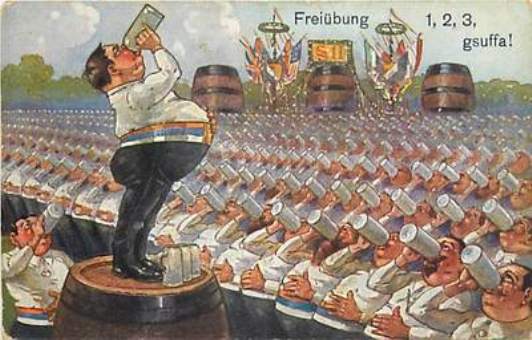
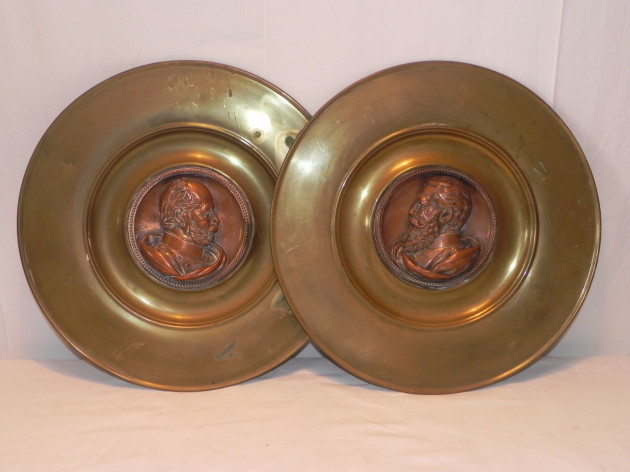
Shown Brass and silvered [lost] copper wall plaques of 2 of the Kaisers that patriotic Germans would have placed in their homes
Kaiser – The leader (Emperor: from the Latin “Caesar.”) of the new German Empire .There were no modern Kaisers until the end of the Franco- Prussian war. These plaques above ▲c. 1888 show the first: Wilhelm I and his son: Frederick III, (the father of Wilhelm II – The last Kaiser of Germany and the one that was most responsible for the losses of World War One.)
Also see: The year of 1888 in this compendium.
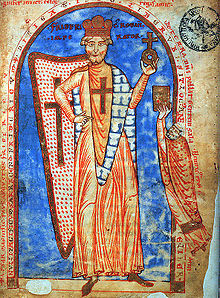
Kaiser Barbarossa (Red Beard) Friedrich I, (* um 1122; †) — See: “Barbarossa.”
Kaiser porcelain steins – One of West Germany’s most prolific stein producers. They made nice quality porcelain steins. Shown: a large PUG 1/2 liter [+]. As I like medieval scenes I had this and it’s companion early in my collecting “career”, and if I had space to display them, I’d probably still have them! Ha I bought them again in 2012( Ifound room enough in my bedroom! SEE: http://www.steinmarks.co.uk/pages/pv.asp?p=stein1
Kaiser prize – An emblem with a wreath with guns / cannons, found on some steins that indicate that regiment won the prize that year in the competition between all the Imperial German Units of their type = Infantry, Jager & Artillery.
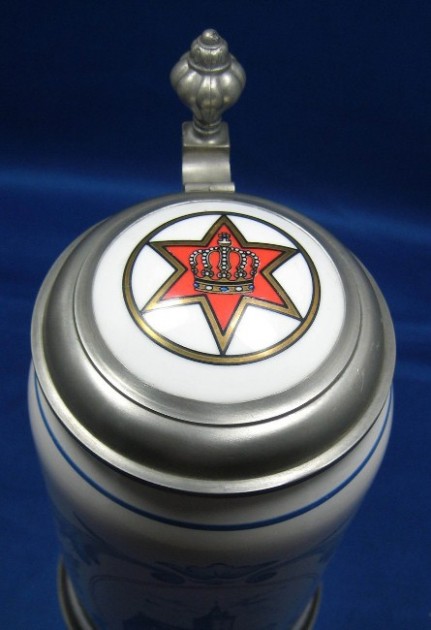
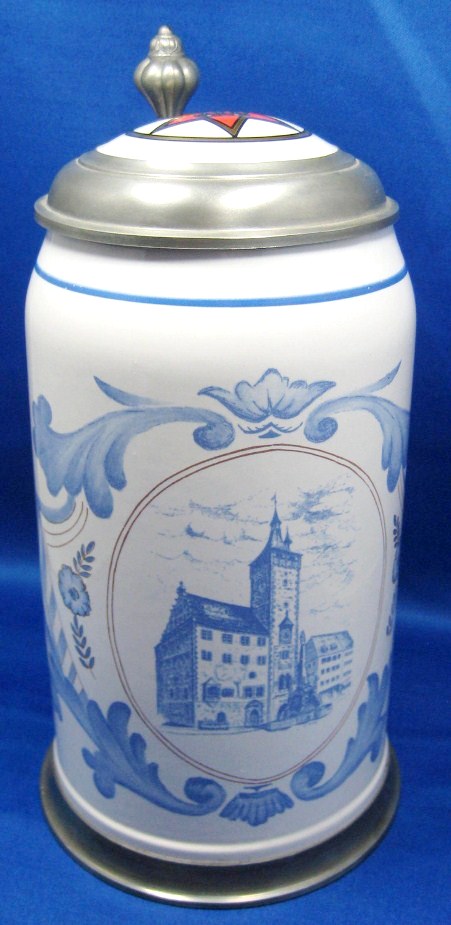
Kannebäcker (notice spelling is not Kannen ) – Hohr -Grenzhausen – Newer stein making firm. Shown: An excellent job on this 1 liter brewery stein made for Wurzburger Hofbrau in 1995.
.
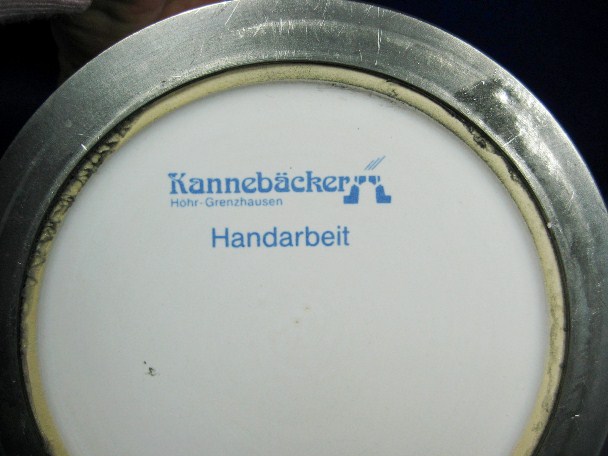
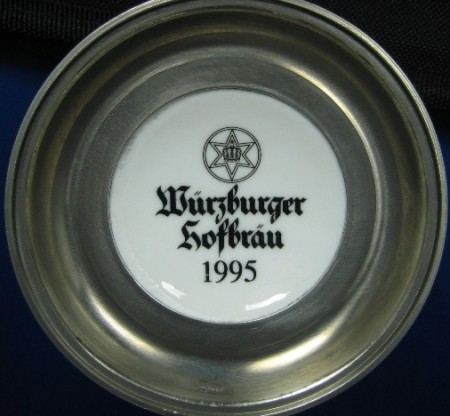
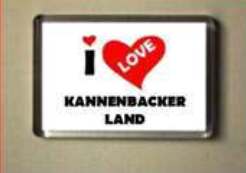
Kannenbäckerland – Literally = Can (jug) baker’s land. Meaning the “Westerwald” area of Germany.
.
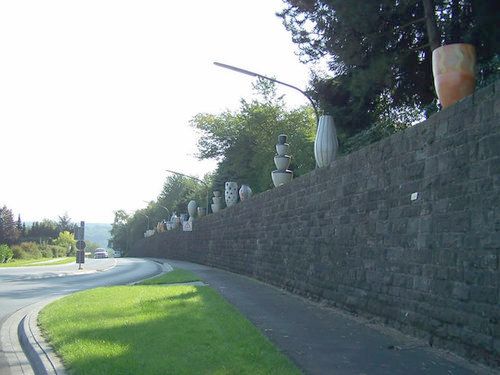
A lovely way to display your shop’s wares, [somewhere] in Kannenbäckerland.
Kassel 1680-1781 – City or town of major fayence stein production. For more info, see: http://www.thepatriotexchange.com/pss/hisfai.htm
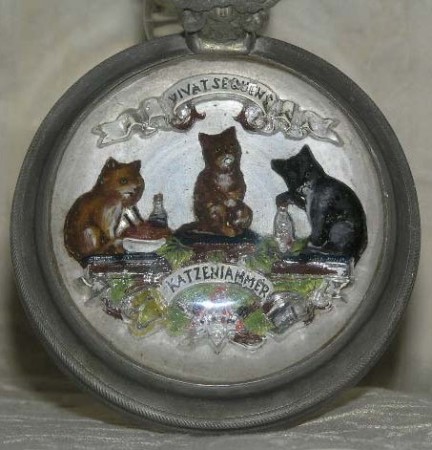
Katzenjammer – The German word for a hangover and a cat is its symbol. Shown: This lid version is a fairly scarce, decorated and then covered with another layer of clear glass. There is also one “bronzed” insert dedicated to these cats which shows the three cats as above.
Kayserzinn – Pewter stein and beaker maker. They started their mold numbering system with #4000. Shown: Server No. 4095, with the Imperial and German state’s arms.
For more examples of this company’s work please see:
http://www.steveonsteins.com/kayserzinn-serving-steins-beakers-etc-partial-catalog-new-9-3
See also : http://www.steinmarks.co.uk/pages/pv.asp?p=stein1
KB – (Anton) Kilian “Karl” Beuler- a Pretty well know modeler/ designed for steins, most made by Germscheid.
For more complete information on this designer See: http://www.steinmarks.co.uk/pages/pv.asp?p=stein470
.
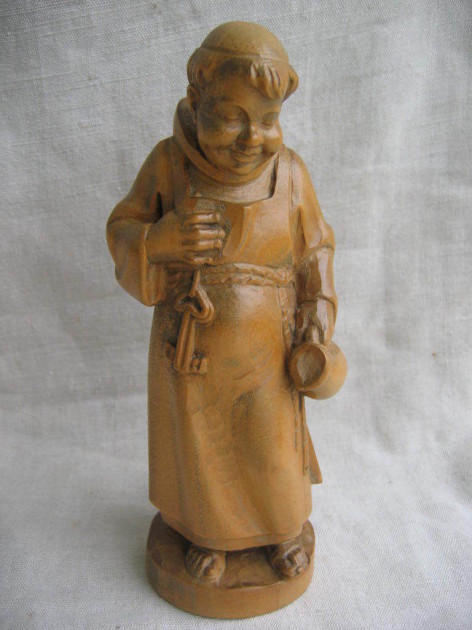
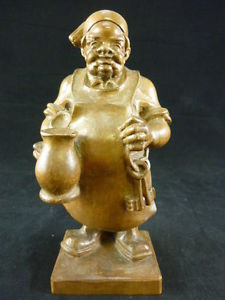
▲ ▲A gasthaus owner with his keys to the “Keller”
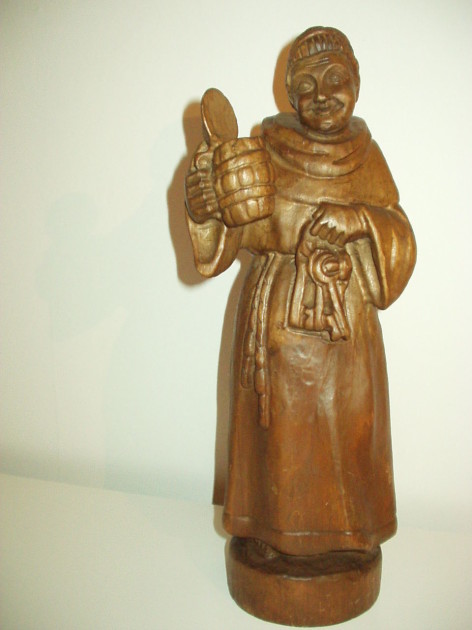
“Keeper of the keys” – A scene that is found a lot on beer steins and mugs . The keeper” of the keys and access to the keller (cellar) (where the beer and wine were stored )was a very important servant in large households and in the monasteries. Of course at family owned pubs and gasthaus’ the owner would be the one to have control.
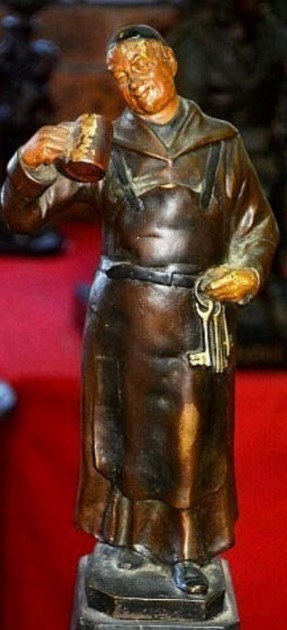
An European cold painted bronze statuette of a monk having key duty.
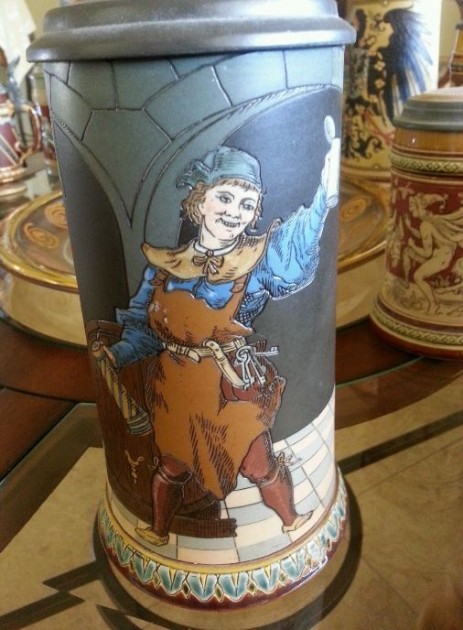
V & B Mettlach’s version of a “Keeper of the keller’s keys ” . No 2776.
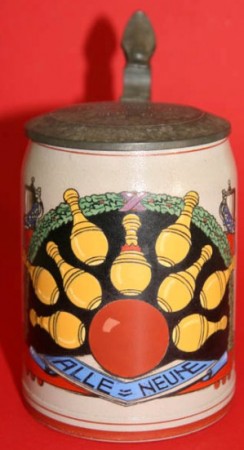
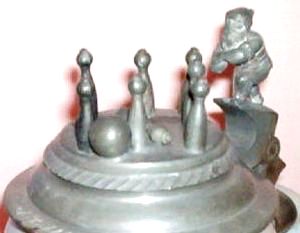
Kegels (Nine pins)- The German sport of bowling with nine wooden pins. Ten pins was a US invention to get around not being allowed to play “Nine Pins” on Sundays. Shown right: Gnome kegeling, the ball and 7 pins standing, 2 down.
For a full article on these sporting steins, see: http://www.steveonsteins.com/kegels-and-pigs-the-predecessors-to-our-10-pins
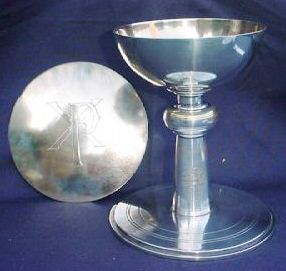
Kelch – German for Chalice. See “Knop” below for more photos of Kelchs. Shown ▲: Small silver(.830 ?) Kelch, made in Belgium in the 1930’s.
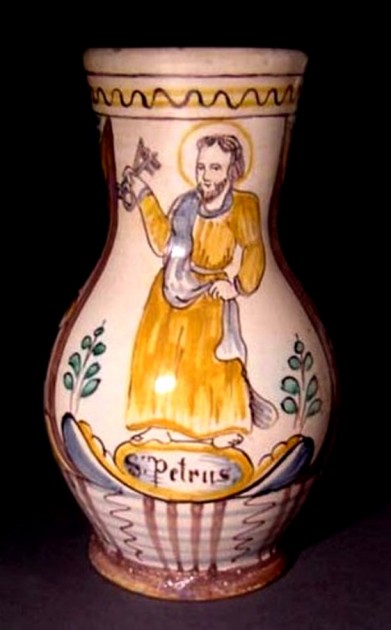
Keys ~ on steins – Besides those shown with a “Keeper” (SEE ABOVE ENTRY) or of St. Peter (the key was his attribute). most often any key shown on steins will be associated with The Arms of German or Other European Cities.
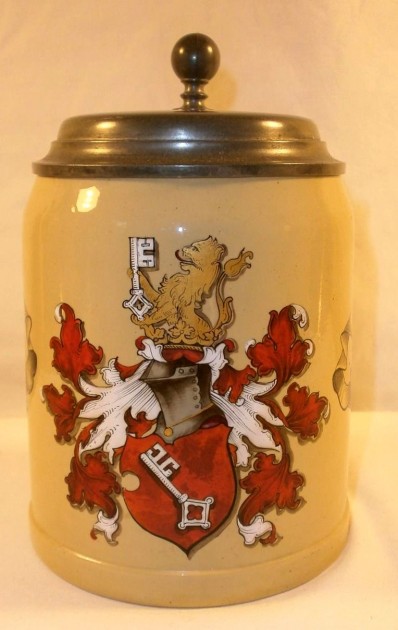
V & B METTLACH – CITY OF FRIEBURG, GERMANY.
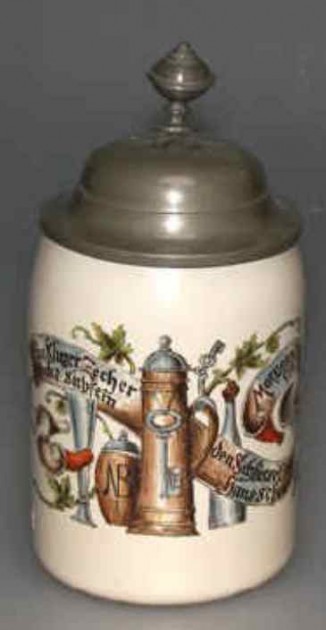
Below ▼ is a novel exception on a new pewter mug. I don’t recall seeing any beer stein with a key handle, but that doesn’t mean there isn’t one!!
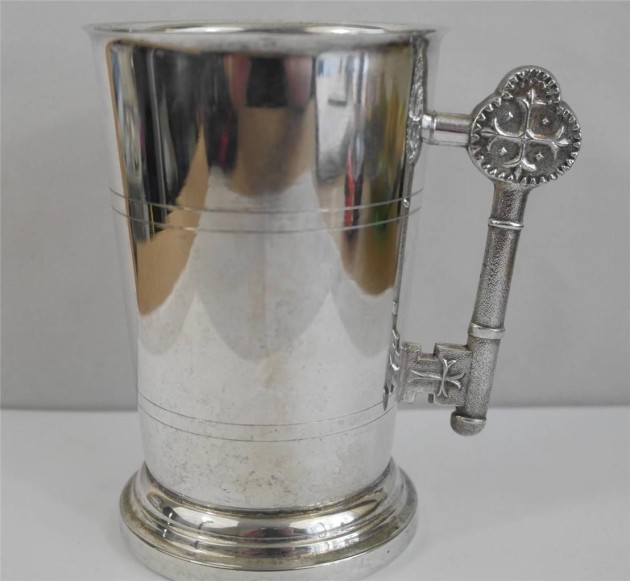
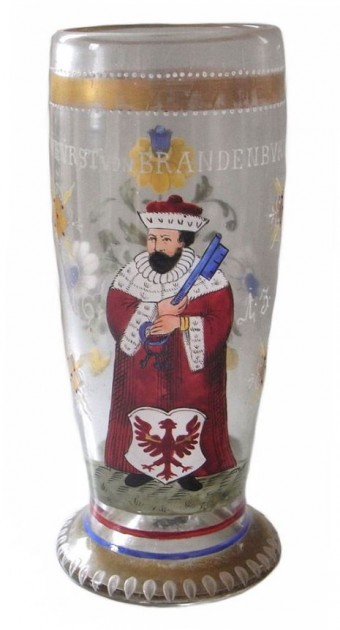
An enameled “Humpen” showing one of the Electors: Kurfürst von Brandenburg 1613. Ca. 1880. Produced by Fritz Heckert.
tThis enameled humpen by Fritx Hechert is a very interesting piece image wise. It shows the Kurfürst (Elector) von Brandenburg (A Historic German State) , dated 1613, He is holding a large key that is actually a key ring for other smaller keys. I will have to do some digging [research] to find out what that represents. Knowledgeable comments from readers are encouraged.
.
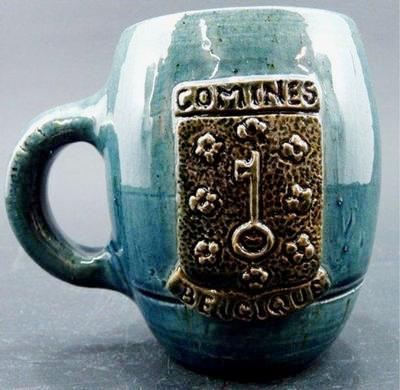
A newer glazed beer mug showing arms of the city.
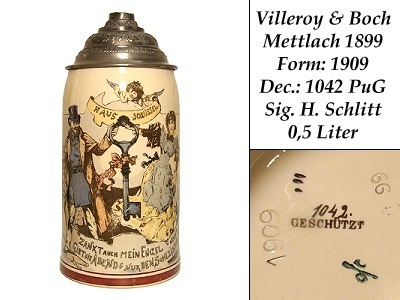
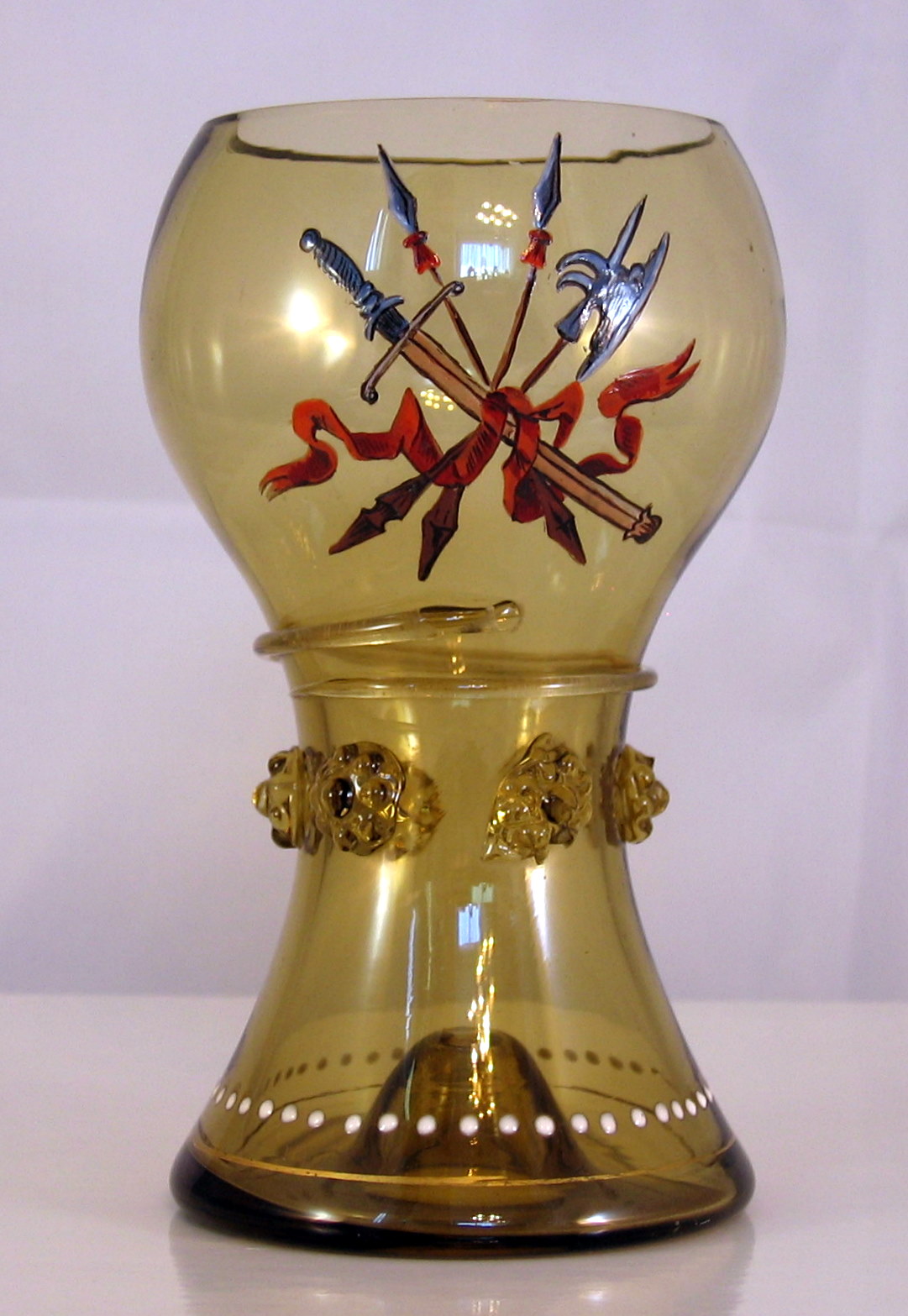
Kick – On the bottom of “antique” glass steins, and vessels, the portion of the base that is pushed upward due to the pontil rod being forced into the glass. Shown above : A simulated “kick” on a Theresienthal beaker.
Some old medieval ‘kicks’ are huge and over exaggerated , as shown below ▼on a new reproduction medieval ‘waldglas’ beaker sold at Corning Museum of Glass, Ca. 1995.
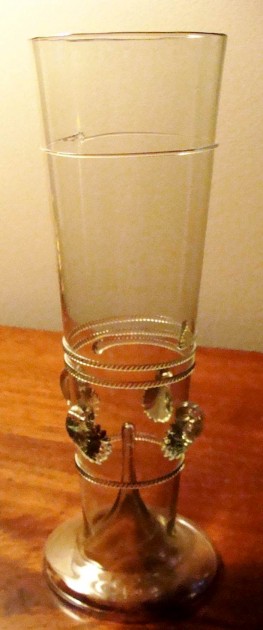
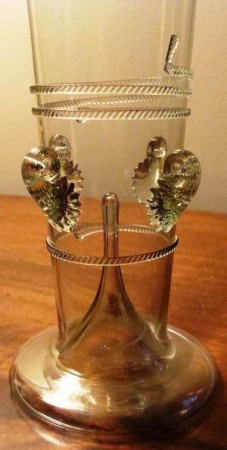
Kiddush cup – (Literally, “sanctification”) A cup most often of silver used during the blessing recited over wine or grape juice to sanctify the Sabbat or a Jewish holiday.
Kiel 1758-1787 – City or town of major fayence stein production. For more info, see: http://www.thepatriotexchange.com/pss/hisfai.htm
Kinders, Kinderkrug — A German child’s beer mug or stein, usually a 1/8th to 1/3 of a liter size. Shown ▲: A 1/8th liter kinder mug decorated by the Saeltzer firm.
See: http://www.steveonsteins.com/kinder-steins-page-1-13rd-of-article-text-only.
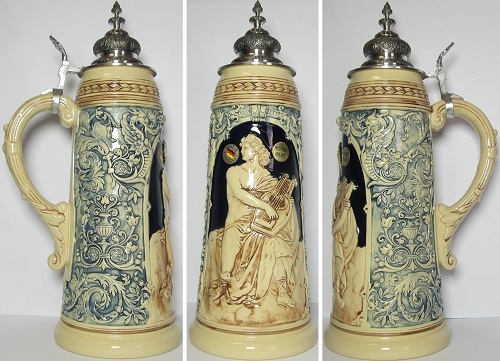
King Limitaet (series) – New (2000) limited editions. Remakes of some of the nicer antique pottery steins. {Very good quality.]
A 2012 ad states: “Apollo” Stoneware Stein
Number 12 of the King Limitaet Series
2500 pieces limited edition
Handcrafted in Germany by King Werks
Made of stoneware with pewter lid
Stein holds 2 liters
Approximately 15 inch tall (39cm )
Ad continues: This limited edition collectible is a true masterpiece of the steinmakers’ art and is based on an historic original currently in the archives of Kings-Werk in Hoehr Grenzhausen Germany. Sculpted by the master sculptor Peter Duemler in the year 1890, this magnificent stein portrays Greek god Apollo and his lyre.
King-Werk a.k.a. Würfel & Müller G.m.b.H. & Co. K.G.– –
King-Werk, also known as Wuerfel and Mueller, is one of only a few remaining German stein companies that still produce 100% of their steins in Germany with 100% German materials and labor, who also made some of the 20th century’s ‘ugliest steins,” such as the one below. They really didn’t need that tail to be another eagle! Oh yes, that’s right, beauty is in the eye of the beholder.
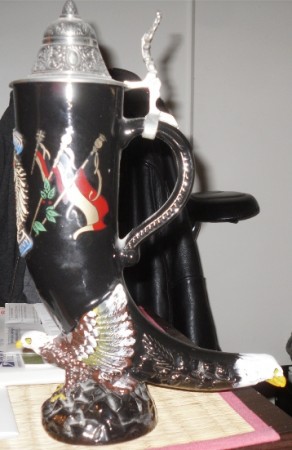
For more info on the firm, see: http://www.steinmarks.co.uk/pages/pv.asp?p=stein1
King’s prize – See “Kaiser prize” but these emblems were only for Bavarian troops as they had a King and not a Kaiser (Emperor.)
Kingsware – ROYAL DOULTON– TAVERN SCENES KINGSWARE [CLOSE TO MAJOLICA FINISH] WHISKEY JUG
![CR- Kingsware - ROYAL DOULTON-- TAVERN SCENES KINGSWARE [CLOSE TO MAJOLICA FINISH] WHISKEY JUG](http://www.steveonsteins.com/wp-content/uploads/2010/10/CR-Kingsware-ROYAL-DOULTON-TAVERN-SCENES-KINGSWARE-CLOSE-TO-MAJOLICA-FINISH-WHISKEY-JUG.jpg)
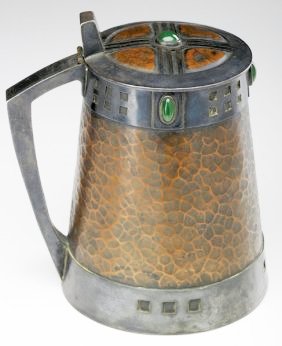
Kipp, Karl –A famous European designer. Shown ▲: A hammered copper and silver stein by Kipp designed for “Roycroft” in the Arts and Crafts style. This one sold for $67, 375 (includes the buyer’s penalty) in September 2008. (And yes that comma is in the correct space!)
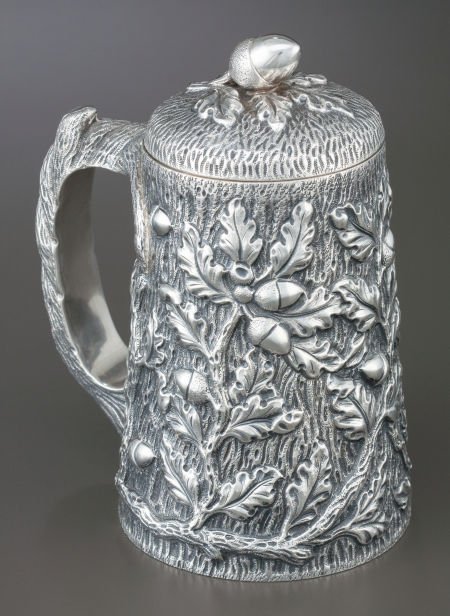
Kirk Silver (S. Kirk & Son, Baltimore, Maryland) – Silver stein with a set-on-lid. Kirk is not noted for their drinking vessels. Circa 1880-1890.
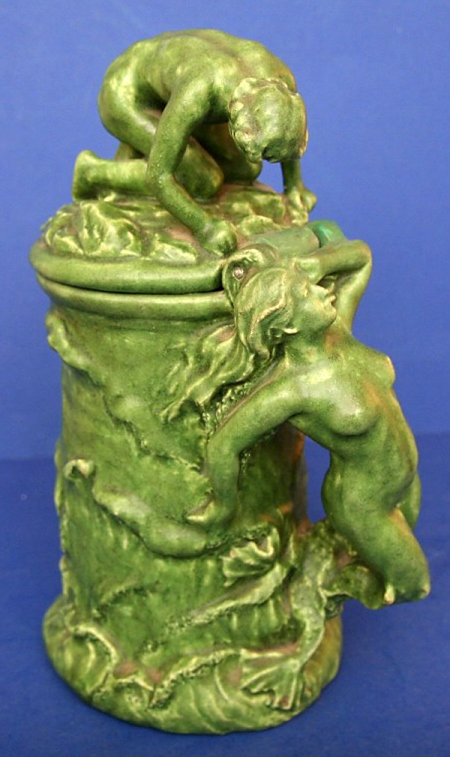
.
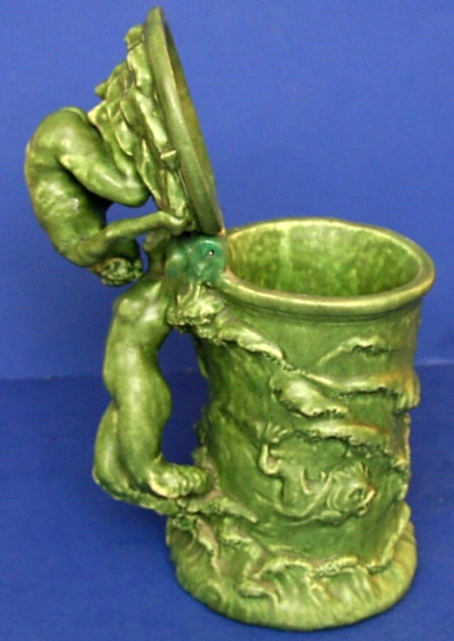
Kissing stein – The original (and probably unique?) could be seen in a bronze version at the Rosary Hill College, Buffalo NY, years ago. This copy is a green stained one liter version in molded pottery relief.
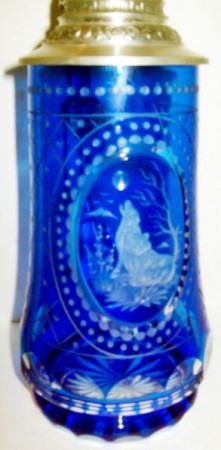
Kisslinger (Kristal Glas) – Late 20th century German glass stein maker. Nice quality. See: http://www.steinmarks.co.uk/pages/pv.asp?p=stein1
Klammerith – Fayence stein maker in Znaim, Hungary. See: http://www.steinmarks.co.uk/pages/pv.asp?p=stein1
![KNOCK OFF [OR] TAKE OFF (COPY OF THE THEME) NEW TAKE OFF ON V&B , METTLACH'SS LAWYER STEIN CENTER'S](http://www.steveonsteins.com/wp-content/uploads/2010/10/KNOCK-OFF-OR-TAKE-OFF-COPY-OF-THE-THEME-NEW-TAKE-OFF-ON-VB-METTLACHSS-LAWYER-STEIN-CENTERS-630x486.jpg)
Knock off – Not a full scale reproduction, but something made to look somewhat like the original, which would have been made by another stein masker around the same time period. Shown above : A ‘knock off’ of the V & B Mettlach book 2001 series book steins (see original below.▼)
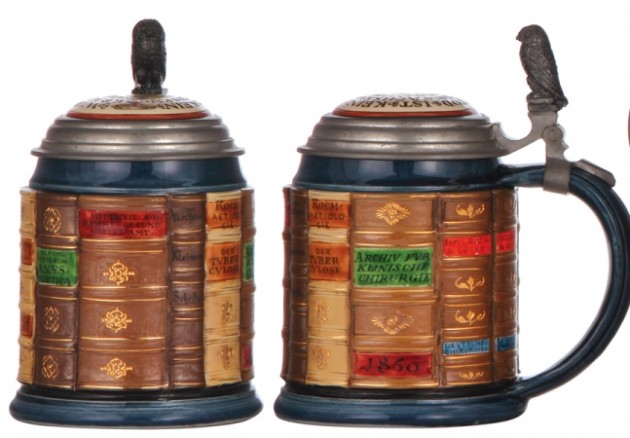
One of the original V & B book steins. See “misnomers” page: http://www.steveonsteins.com/beer-stein-dictionary-1
Knop — An abrupt widening in the middle of the stem of a chalice, cup, or wine usually global or egg-shaped. A flattened spherical or compressed round bubble, finger separator, on a wine glass / chalice’s stem, approximate one half way up the stem. Shown: Three types of knops on silver chalices (See ‘For sale’ page.)
CR- KOLCH BEER, MADE FOR—A GLASS STEIN, .800 SILVER LID – KOLSH LOOK IT UP.
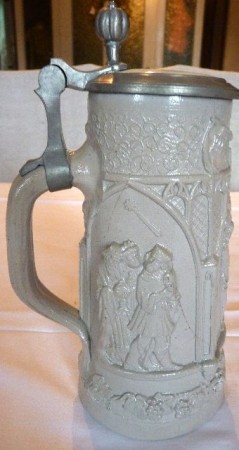
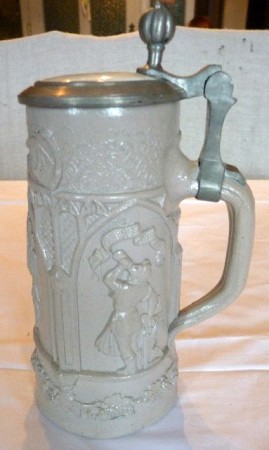
Koln steins – See Cologne, City, and ‘also Cologne Cathedral’ mugs and steins (as above.)
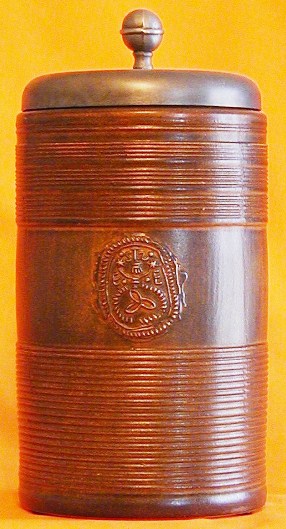
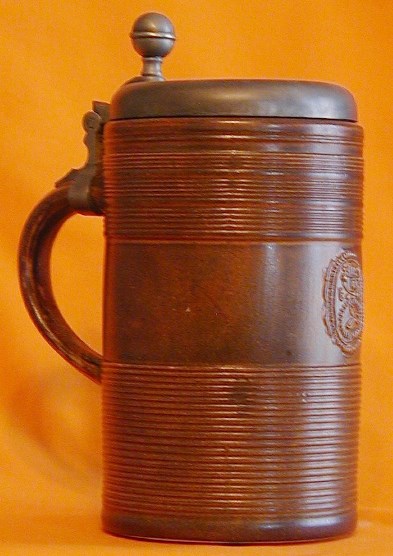
König Brewery, Germany – Series of reproduction older steins –The stein shown above ▲, is a replica / repro of a Rären) Raeren) stein (Ca. 1700) and was issued in 1980 by the König Brewery (Duisburg, Germany). This company issued Jahreskrüge from 1976 through 1993. It is 8.75 inches tall to the top of the thumblift and 4.125 inches diameter at the base. This one was manufactured by Gerz.
Editor’s Note: If you can’t afford the real thing, I believe these are about the best reproductions on the market today!
I’m going to start listing these one by one starting on 7-26-2013, in the meantime, if you should belong to the organization , see SCI’s “Prosit” for December 2010 for an article on this series of jahreskrüge.
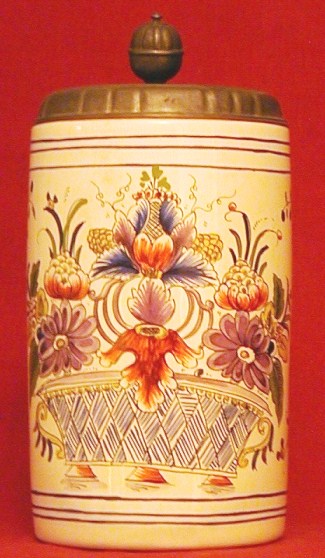
Another of the series: A copy of a Thüringen Faience stein (Ca. 1740). Issued in 1986 by the König Brewery. It is 8.75 inches tall to the top of the thumblift.
,
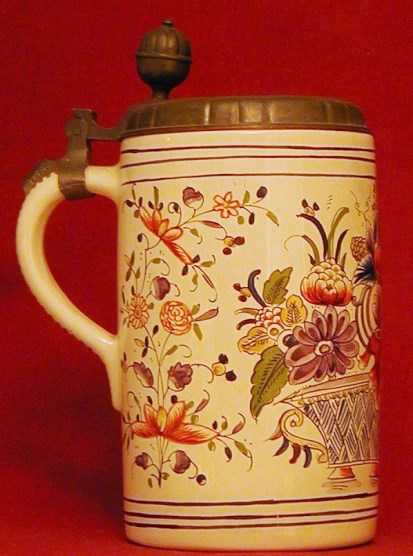
.
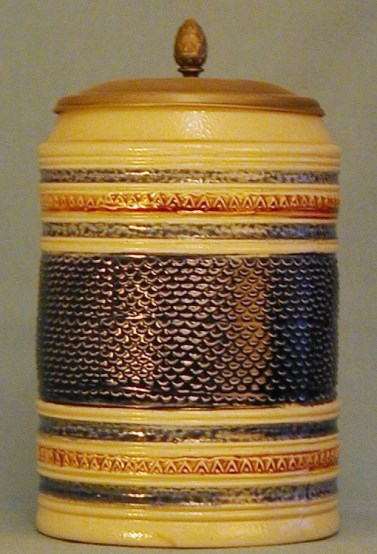
Copy of a Westerwald stein (c. 1700) and was issued in 1977 by the König Brewery.
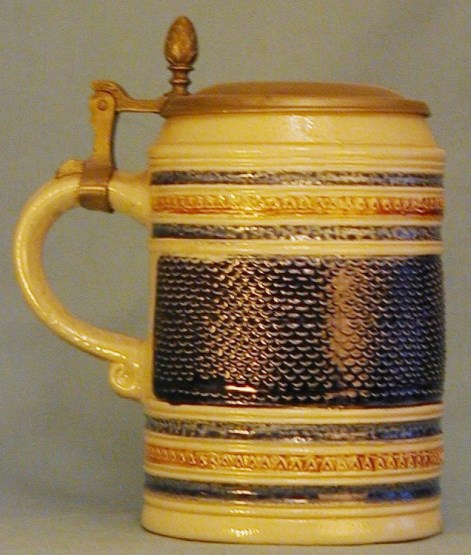
.
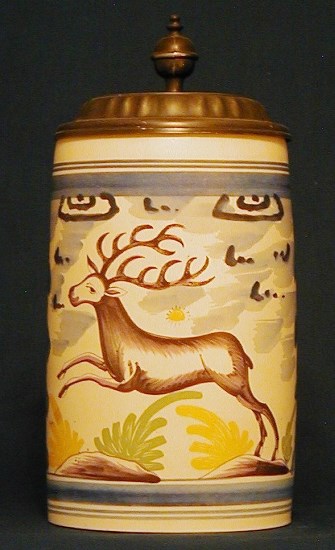
Copy of a Bareuth Faience stein (c. 1700) and was issued in 1984 by the König Brewery.
,
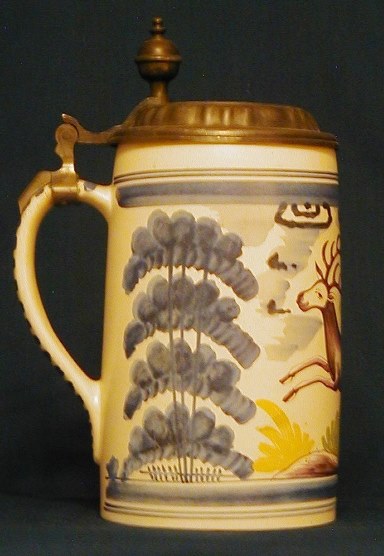
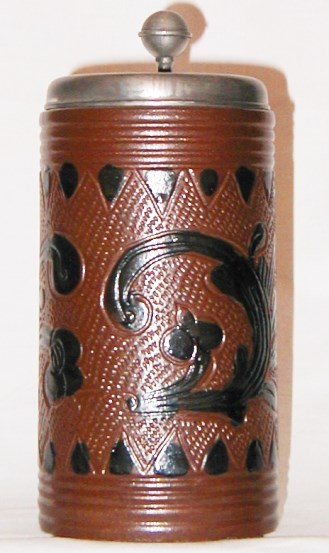
Copy of a Muskauer stein (c. 1790) and was issued in 1978 by the König Brewery.
,
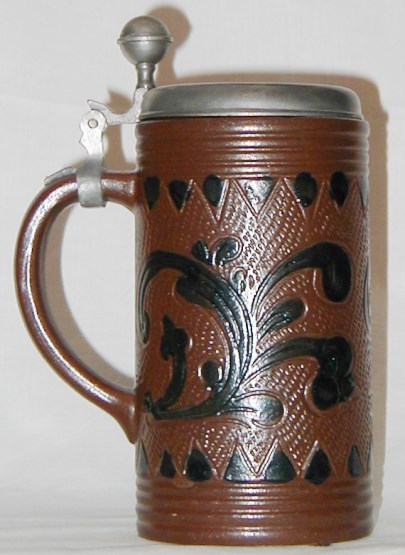
.
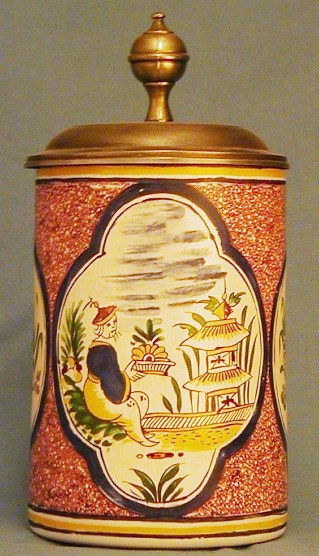
Copy of a Nürnberger Faience stein (c. 1850) and was issued in 1993 by the König Brewery.
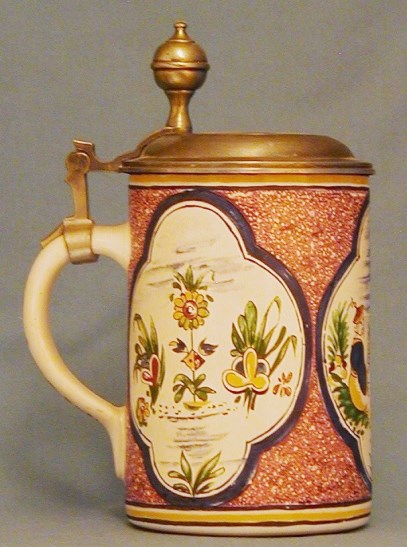
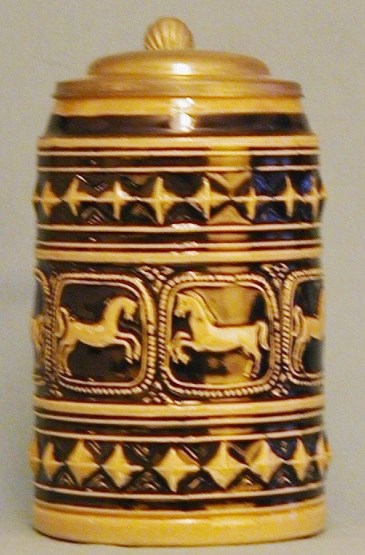
Copy of a Westerwald stein (c. 1800) and was issued in 1979 by the König Brewery.
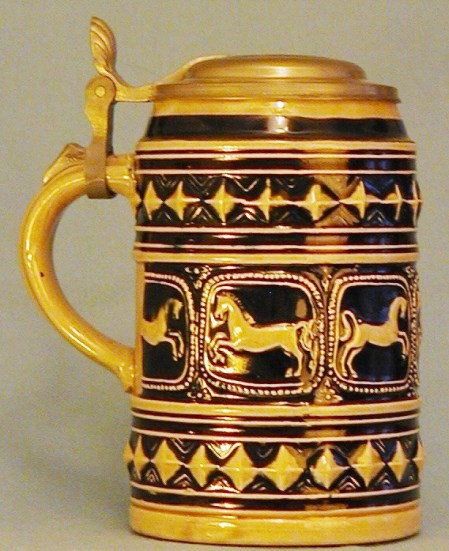
.
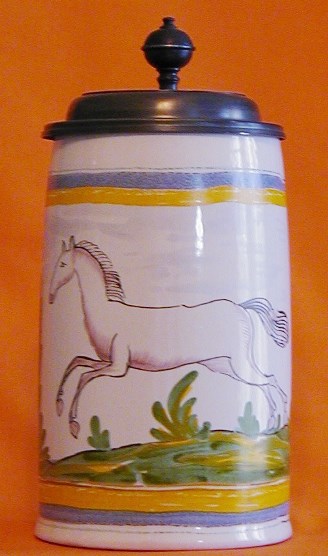
Copy of a Grailsheim Faience stein (c. 1700) and was issued in 1985 by the König Brewery
,
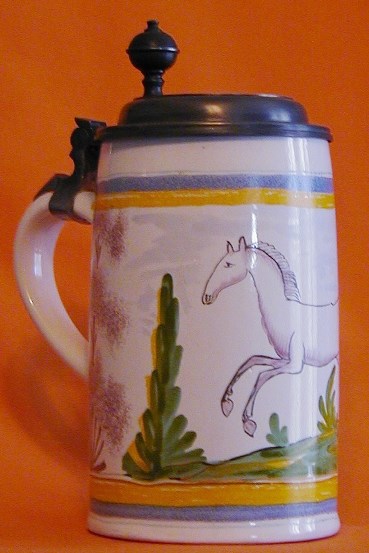
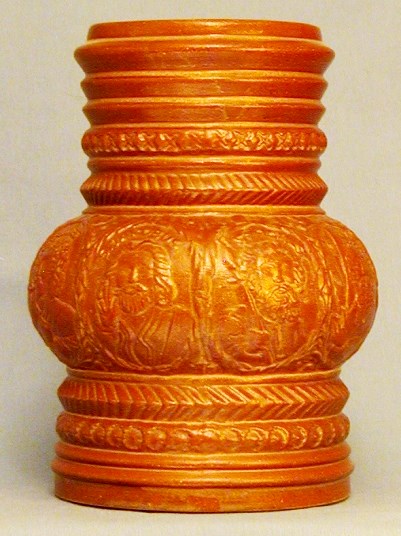
Copy of an Altenburger Apostle stein (c. 1660) and was issued in 1989 by the König Brewery.
,
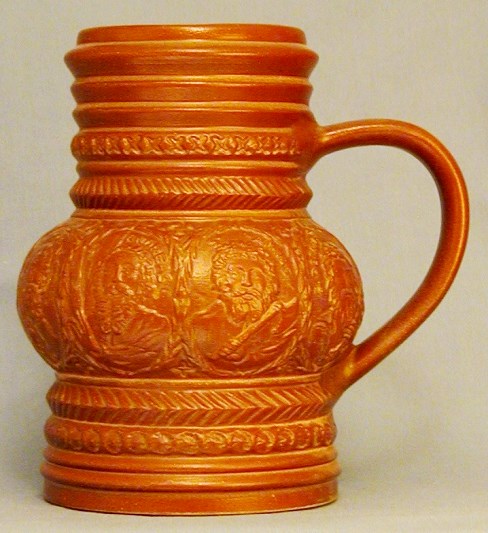
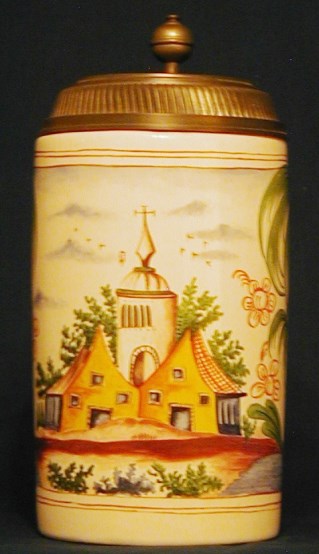
Copy of a Berlin – Menicus Faience stein (c. 1780) and was issued in 1988 by the König Brewery.
,
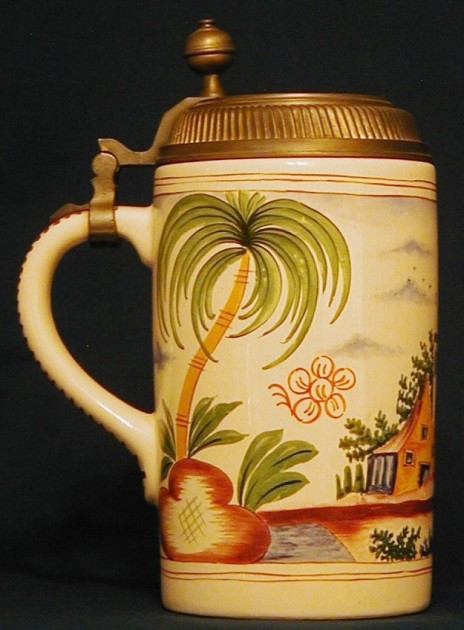
Copy of a Westerwald stein (c. 1700) and was issued in 1981 by the König Brewery.
,
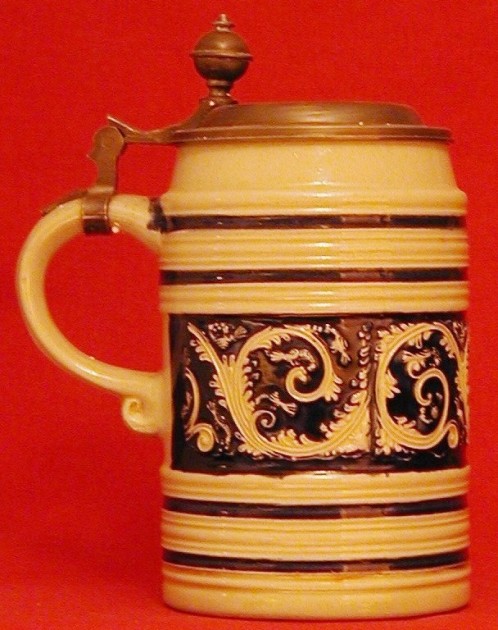
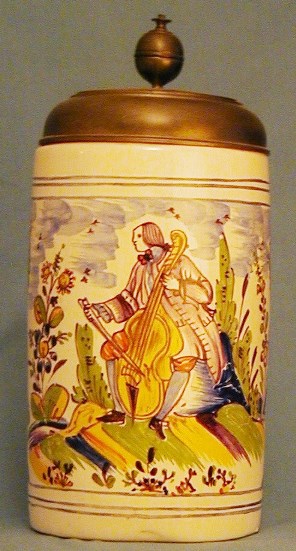
,
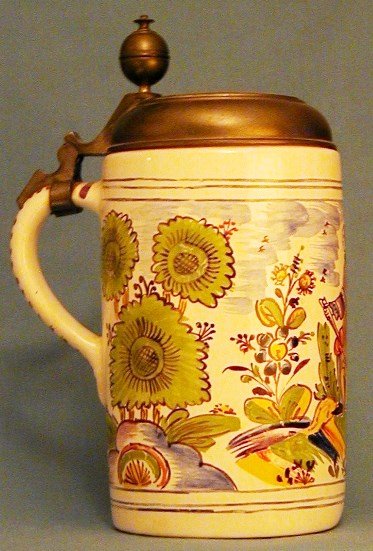
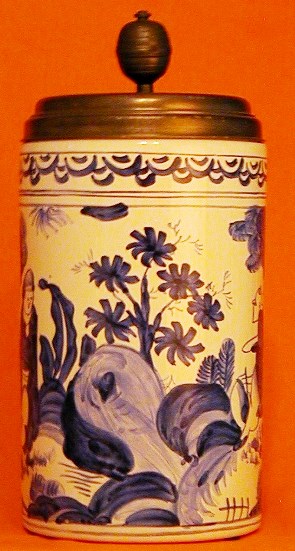
,
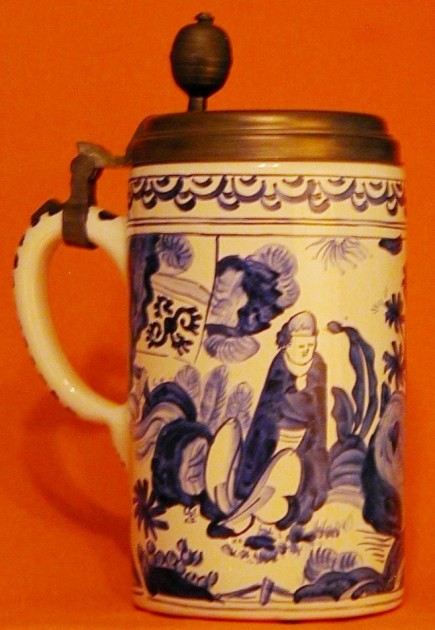
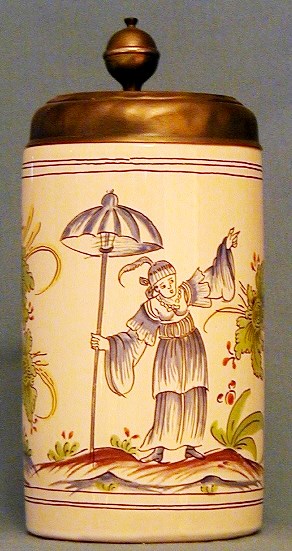
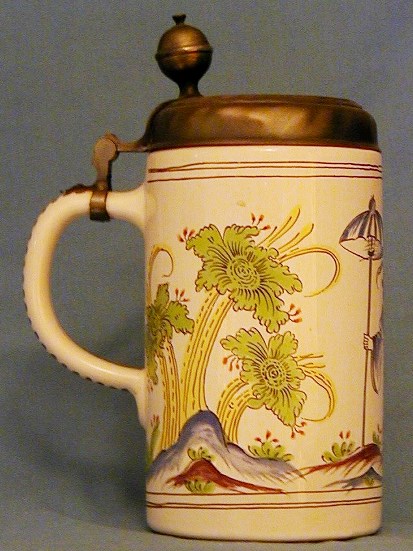
.
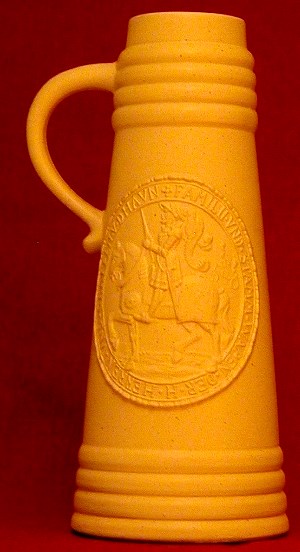
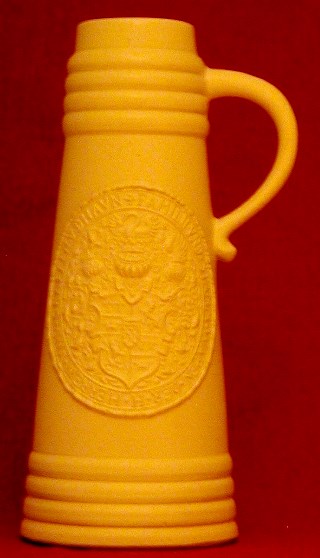
.
Editor’s note: I f one wishes to learn more about these reproductions and other series that have been recently produced in Germany then I heartily recommend you buy this book.▼ ▼ This was listed on Ebay in 1 -2014
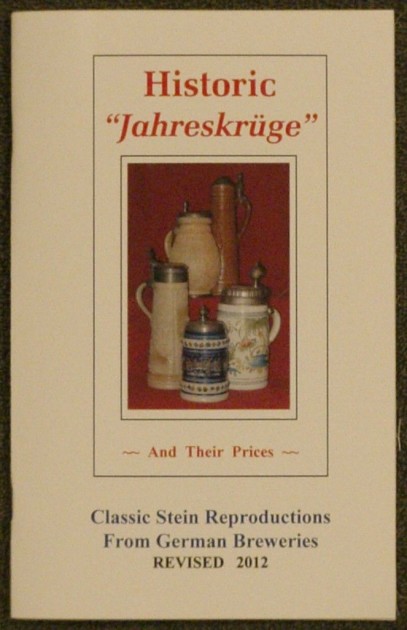
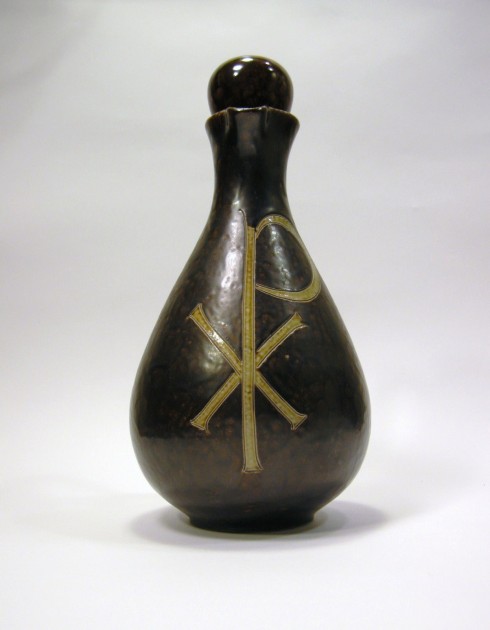
Kopp, Elfriede Balzarwas a famous German ceramic potter. She was born Elfriede Kopp in Berdorf, Luxembourg in 1904 and her surname changed to Balzar-Kopp upon marriage circa 1927. Died Höhr-Grenzhausenfont in 1983. Active 1927 – 1973. Formed the G.m.b.H in 1930.Collaborated in techniques with Wim Mühlendyck.
See: http://www.steveonsteins.com/wim-muhlendycks-animal-steins
Kovsh – Russian drinking bowl (originally a dipper into a water barrel.)They got their inspiration from the Vikings that settled Russia (Varangians) in the very early days. Very similar to the “drinking bowls” made in the North Baltic Countries. Shown: Two different examples; the bird form is well liked in Russia.
K.P.M., Königliche Porzellan Manufactur (Berlin) – Porcelain stein maker for years; they have as a good reputation worldwide, but for some reason US stein collectors are not too crazy about their old stein wares. I believe they are highly undervalued here in the USA.
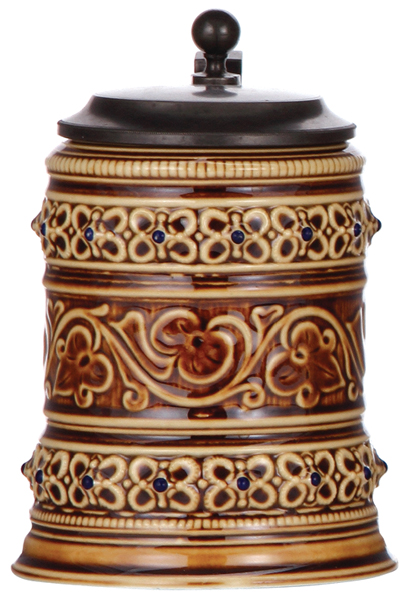
.
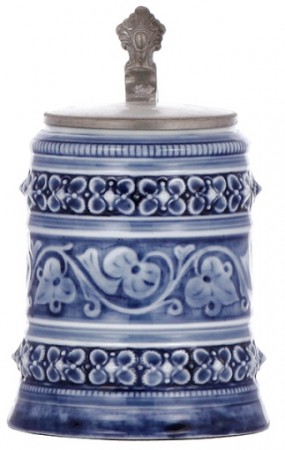
Above [2] : Porcelain stein, .5L, glazed relief, marked K.P.M. (Königliche Porzellan Manufaktur Berlin) mid 1800s. Different colors and lids. [TSACO],
For marks, etc., see: http://www.steinmarks.co.uk/pages/pv.asp?p=stein1
For lots of additional info please see: http://www.foxauctionsonline.com/KPM%20Porcelain%20Steins.pdf
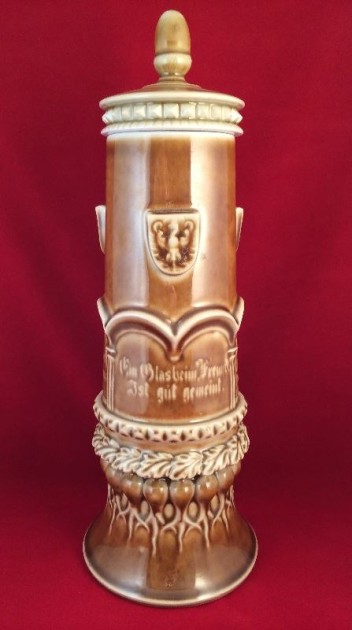
Above ▲ a nice clean lines KPM molded relief pokal with the Imperial Eagle on a shield . About 10 inches tall with lid
.
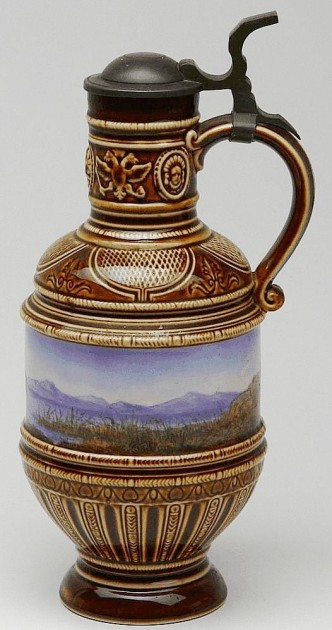
A beautifully painted KPM beer server. These types can bring big bucks in Europe.
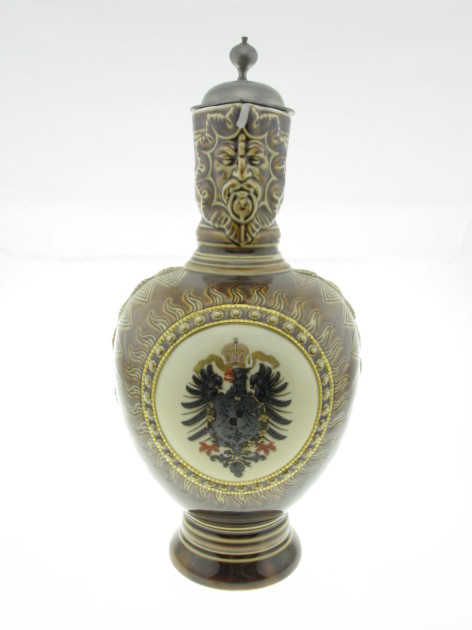
CR- Kraus, Charlotte –Design [PJ] Jugendstil Beer Stein
![CR- Charlotte Kraus --Design [PJ] Jugendstil Beer Stein](http://www.steveonsteins.com/wp-content/uploads/2011/01/CR-Charlotte-Kraus-Design-PJ-Jugendstil-Beer-Stein.jpg)
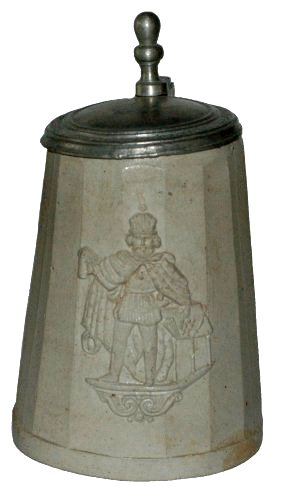
Krebs- A not so well known stoneware stein maker from the town of Hohr in the Westerwald. Shown: A .5 liter with “Gambrinus” in relief.
See: http://www.steincollectors.org/steinmo/2006/Krebs.html
Also see: http://www.steinmarks.co.uk/pages/pv.asp?p=stein380
For info on Gambrinus, see: http://www.steveonsteins.com/gambrinus-the-king-of-beers-draft
1880 Kreitman Munich Bavaria cranberry prunts Kreitman Munich Bavaria MAY BE GOOD INFO
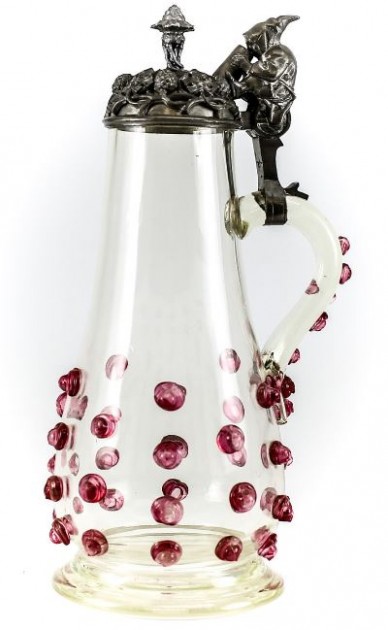
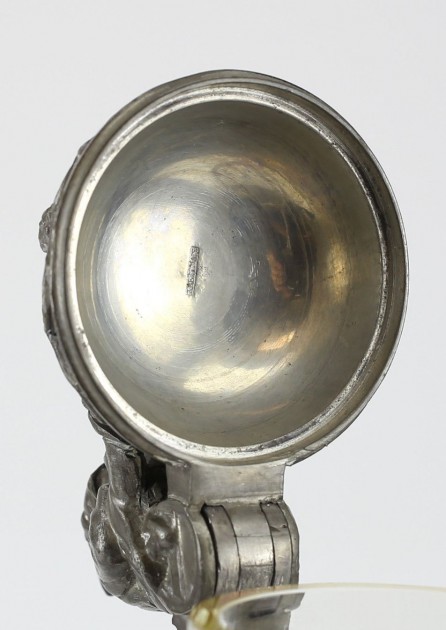

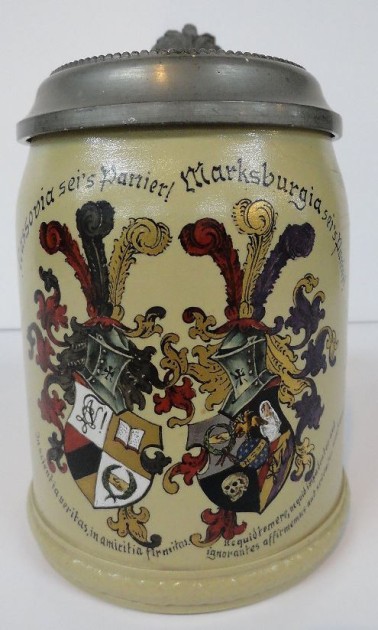
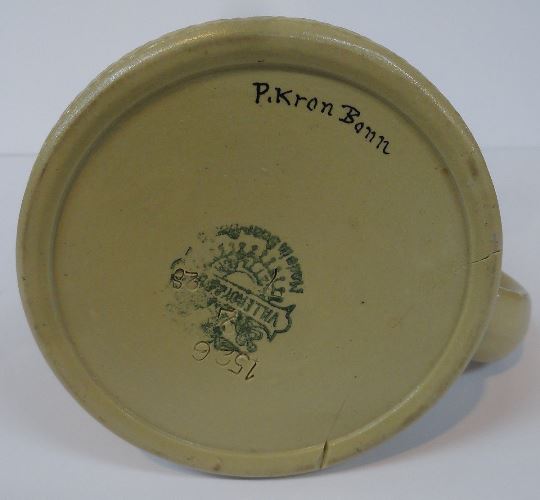
Kron, P. – A designer / illustrator’s workshop located in Bonn, Germany. Did outstanding detail work .
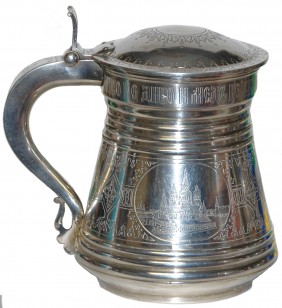
Kruzha – A Russian name for tankard.
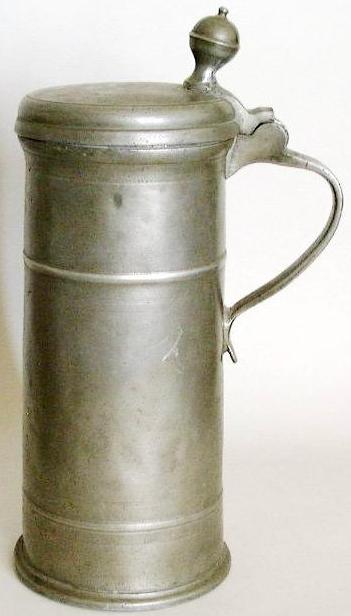
Krug — Old German – Literally “a jug” but often used to indicate a stein such as “zinnkrug” = pewter stein and sometimes just a large, or master stein / server. Shown: A 10 inch tall zinnkrug from Ostfreisland (North Germany), Circa 1760. [FWTD]
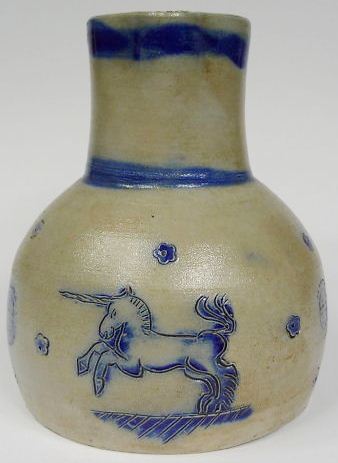
Kugelbauchkanne – German for “Ball Bellied Pot.” Shown: A 6.8 in tall Westerwald version. Circa 1850. The unicorn is seldom ever seen on German steins, etc!
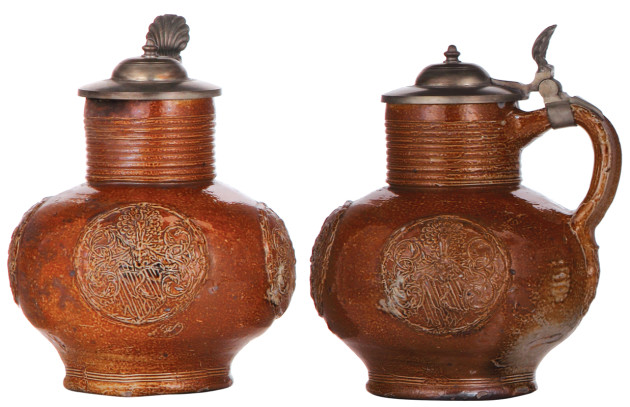
ANOTHRER -This one is from Raeren, ca. 1500’s [tsaco]
.
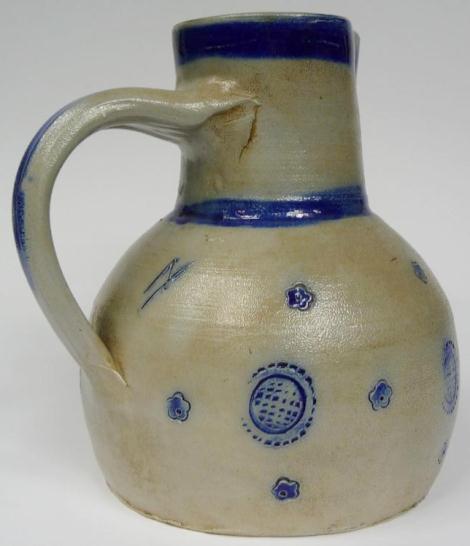
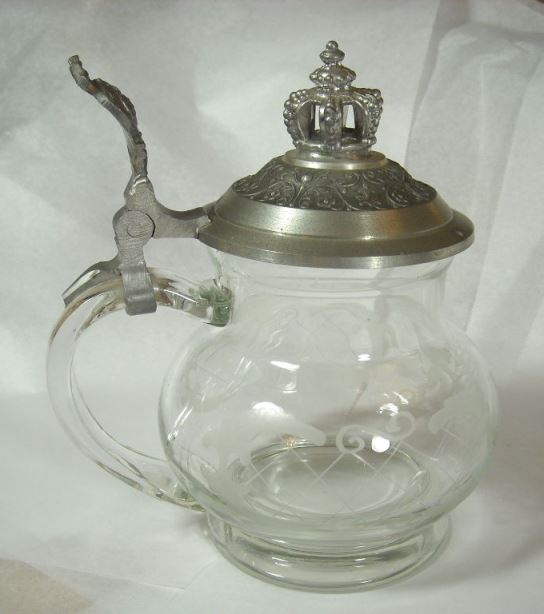
Kuhr Zinn – A newer German company Ca. 1970’s , makers of nice quality pewter lids.
Kunersberg, 1745-1767 – City or town of major fayence stein production. For more info, see:
http://www.thepatriotexchange.com/pss/hisfai.htm
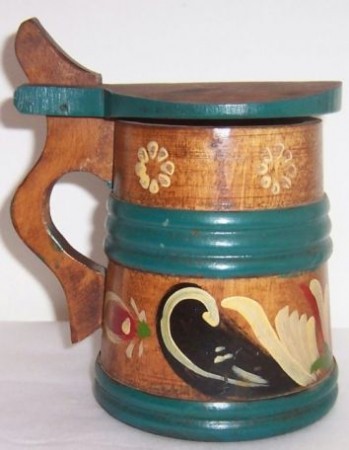
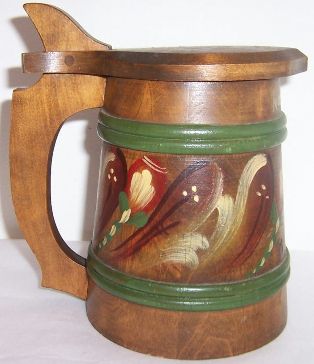
Kurbits – Kurbits painting is a decorative style of painting that was very popular in Sweden between 1780 and 1870, particularly in Dalarna and southern Norrland. It’s still very popular to this day.It appears on wood, fabric, pottery etc (Definition and stein photos courtesy of Chris = mcd1ent @ ebay.com)
.
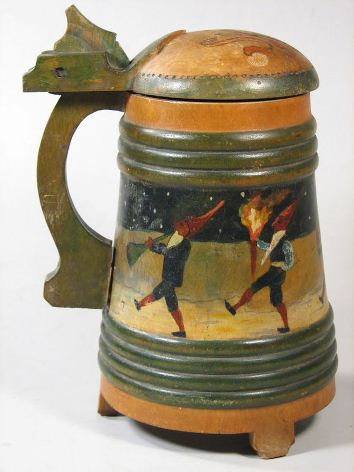
Older type of Kurbits using figures and not designs.
CR- KURT HAMMER PORCELAIN LIDDED BEER STEIN – BEAUTIFUL FRAULEINS GERMANY
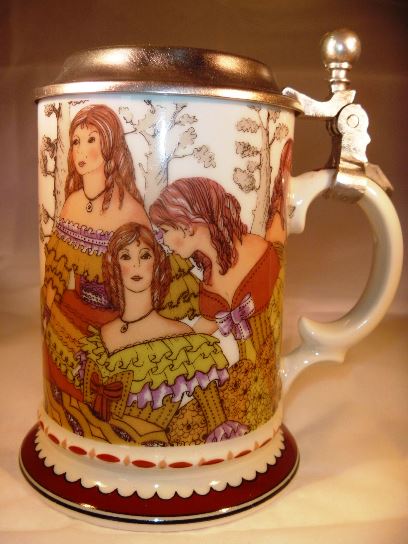
[END – SP104 -106 – R5]
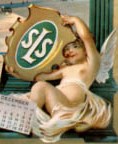 “Unless you’re the lead dog, the view never changes.”
“Unless you’re the lead dog, the view never changes.”

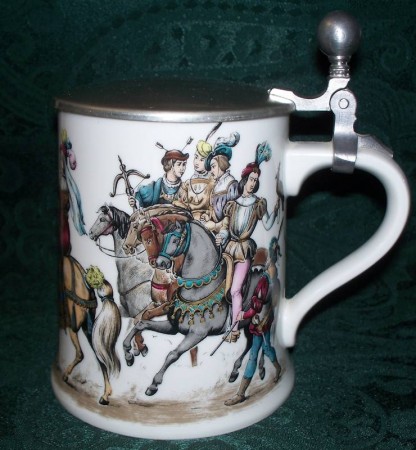
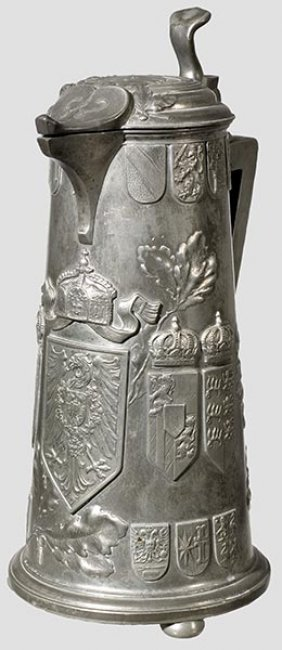
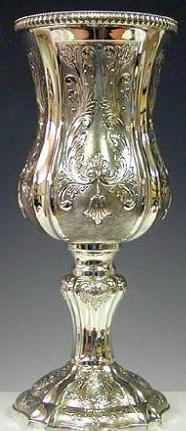
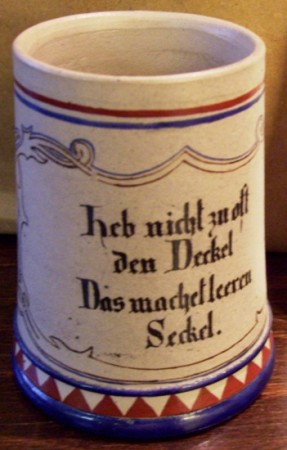
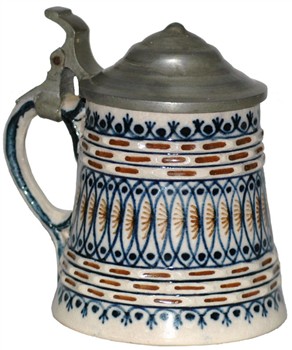
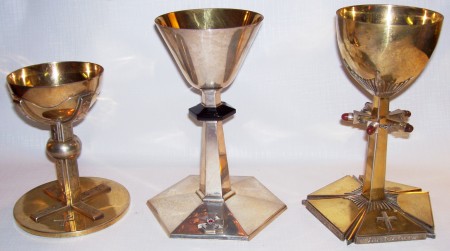
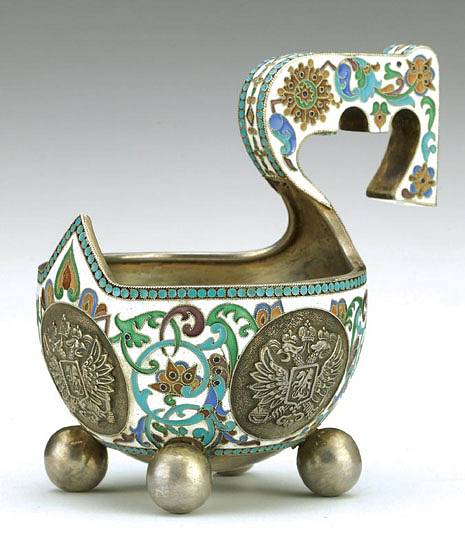
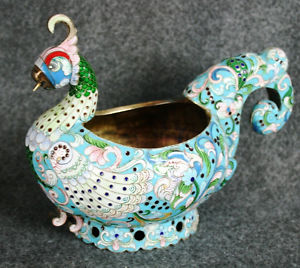
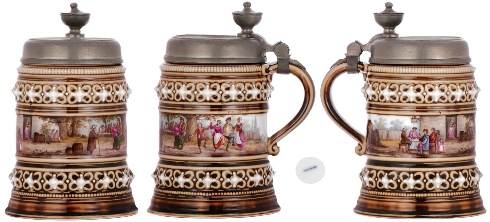
Leave a Reply